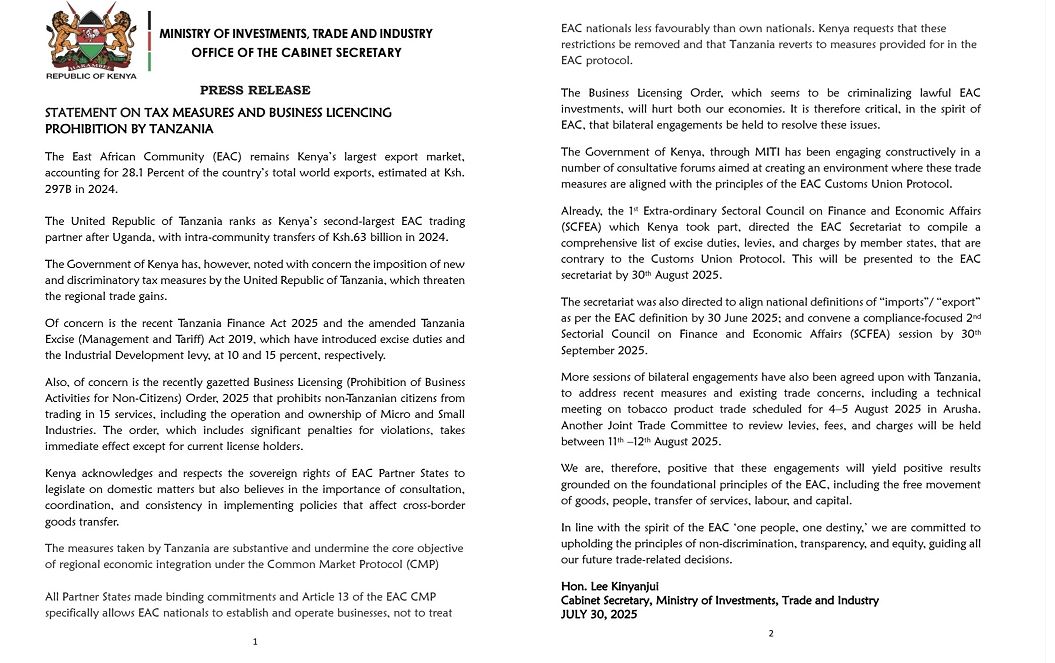Kenya Govt Statement on Tanzania Ban of Small Business Licensing for foreigners
Kenya Government Statement on Tanzania's Banning of Small Business Licensing for businesses operated by foreigners.

The East African Community (EAC) remains Kenya’s largest export market, accounting for 28.1 percent of the country’s total world exports, estimated at Ksh. 297B in 2024.
The United Republic of Tanzania ranks as Kenya’s second-largest EAC trading partner after Uganda, with intra-community transfers of Ksh.63 billion in 2024.
The Government of Kenya has, however, noted with concern the imposition of new and discriminatory tax measures by the United Republic of Tanzania, which threaten the regional trade gains.
Of concern is the recent Tanzania Finance Act 2025 and the amended Tanzania Excise (Management and Tariff) Act 2019, which have introduced excise duties and the Industrial Development levy, at 10 and 15 percent, respectively.
Also, of concern is the recently gazetted Business Licensing (Prohibition of Business Activities for Non-Citizens) Order, 2025 that prohibits non-Tanzanian citizens from trading in 15 services, including the operation and ownership of Micro and Small Industries. The order, which includes significant penalties for violations, takes immediate effect except for current license holders.
Kenya acknowledges and respects the sovereign rights of EAC Partner States to legislate on domestic matters but also believes in the importance of consultation, coordination, and consistency in implementing policies that affect cross-border goods transfer.
The measures taken by Tanzania are substantive and undermine the core objective of regional economic integration under the Common Market Protocol (CMP).
All Partner States made binding commitments and Article 13 of the EAC CMP specifically allows EAC nationals to establish and operate businesses, not to treat EAC nationals less favourably than own nationals. Kenya requests that these restrictions be removed and that Tanzania reverts to measures provided for in the EAC protocol.
The Business Licensing Order, which seems to be criminalizing lawful EAC investments, will hurt both our economies. It is therefore critical, in the spirit of EAC, that bilateral engagements be held to resolve these issues.
The Government of Kenya, through MITI has been engaging constructively in a number of consultative forums aimed at creating an environment where these trade measures are aligned with the principles of the EAC Customs Union Protocol.
Already, the 1st Extra-ordinary Sectoral Council on Finance and Economic Affairs (SCFEA) which Kenya took part, directed the EAC Secretariat to compile a comprehensive list of excise duties, levies, and charges by member states, that are contrary to the Customs Union Protocol. This will be presented to the EAC secretariat by 30th August 2025.
The secretariat was also directed to align national definitions of “imports”/“export” as per the EAC definition by 30 June 2025; and convene a compliance-focused 2nd Sectorial Council on Finance and Economic Affairs (SCFEA) session by 30th September 2025.
More sessions of bilateral engagements have also been agreed upon with Tanzania, to address recent measures and existing trade concerns, including a technical meeting on tobacco product trade scheduled for 4-5 August 2025 in Arusha. Another Joint Trade Committee to review levies, fees, and charges will be held between 11th –12th August 2025.
We are, therefore, positive that these engagements will yield positive results grounded on the foundational principles of the EAC, including the free movement of goods, people, transfer of services, labour, and capital.
In line with the spirit of the EAC ‘one people, one destiny,’ we are committed to upholding the principles of non-discrimination, transparency, and equity, guiding all our future trade-related decisions.
Hon. Lee Kinyanjui
Cabinet Secretary, Ministry of Investments, Trade and Industry
JULY 30, 2025